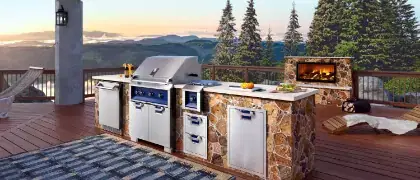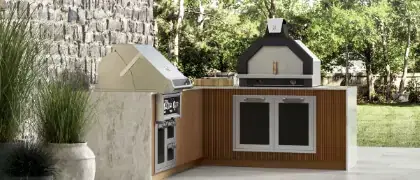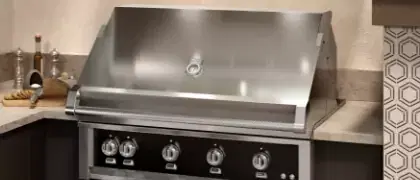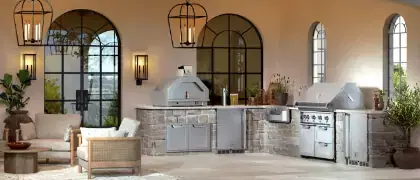Let's Make it (Email) Official
Become an AuthenTEAK Insider and be first to know about new collections, exclusive sales, and special offers.
Let's Make it (Email) Official
Become an AuthenTEAK Insider and be first to know about new collections, exclusive sales, and special offers.


Although an outdoor kitchen is designed to be durable throughout the seasons, the colder months do require a few additional measures to protect your outdoor kitchen and prevent costly repairs down the road. Read on for our expert guide to properly winterizing your outdoor kitchen.

Any water remaining in your outdoor kitchen’s plumbing system has the potential to freeze over, causing pipes to burst and costing you repair fees—and a significant hassle. To prevent this from happening, it’s important to properly winterize your outdoor sink, as well as any other appliances connected to water supply lines (such as refrigerators or ice makers).
First, turn off the water valves (these are likely located underneath the sink) to cut off your water supply. Once your water is off, turn on your sink’s faucet to drain any excess water. To clear any water left in the drain valves, you can use compressed carbon dioxide to clear water from the lines. As an added step, you can pour antifreeze down the drain to prevent any freezing. It’s also a good idea to cover your sink while its not in use to keep out any dirt or debris.

If you have a built-in gas grill, make sure your gas supply is turned off. It’s also a good idea to give your grill a thorough clean so that it’s ready to go come spring. You can also coat the inside of your grill in cooking oil to prevent any rust. Lastly, place a grill cover on your grill to keep it protected from the elements. If you’re storing your grill away for the winter, make sure the propane tank is disconnected or—if your grill is connected to a gas line—that the end of the line is covered to keep out any unwanted critters.

Power off any appliances—like ice makers or refrigerators—and give them a good cleaning inside and out. Outdoor kitchens from brands such as Urban Bonfire, Haven Outdoor, and Danver are made from premium-quality, extremely resilient materials and can be cleaned with soap and mild water. To prevent any damage, it’s also a good idea to cover appliances with a high-quality, specially-made cover.
See also: Our Outdoor Kitchen Planning Guide
Categories
Recent Posts